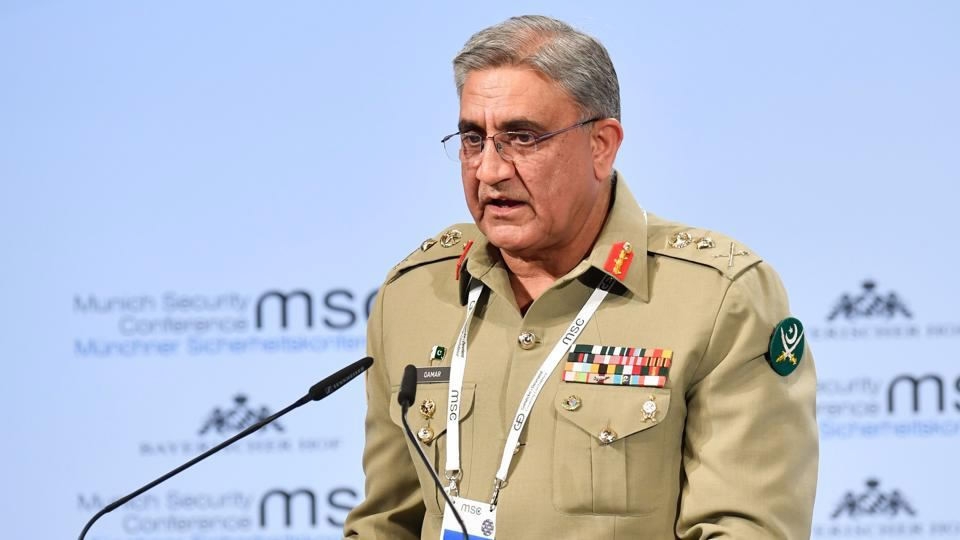Pakistan and India have accused each other of violating a 1974 protocol on religious tourism, a day after the army chief of the former said disputes could be resolved through dialogue.
India alleged Sunday that Pakistan had prevented its high commissioner from meeting Sikh pilgrims at a shrine. Pakistan rejected the accusation, turning the table on New Dehli and saying it has twice in this year denied visas to pilgrims to visit shrines of Muslim saints.
The latest round of allegations came on Sunday, a day after Pakistan Army Chief Gen Qamar Javed Bajwa said peace with India was possible only through dialogue, hinting also at the core issue of Kashmir, which has been a bone of contention between the two countries for long.

Pakistan's Chief of Army Staff Qamar Javed Bajwa addressing a passing out parade of cadets at the Pakistan Military Academy in Kakul on Saturday, April 14, 2018. /AFP Photo
Pakistan's Chief of Army Staff Qamar Javed Bajwa addressing a passing out parade of cadets at the Pakistan Military Academy in Kakul on Saturday, April 14, 2018. /AFP Photo
What is the protocol?
The two countries in September 1974 signed a protocol, constituting an understanding on visits to religious shrines.
The governments in both countries said that they took note of the sentiments and devotion of the various communities for the historical and sacred shrines in the other.
As per the protocol, such pilgrimages from one country to the other shall be permitted without discrimination as to sect or religion and every effort should continue to be made to guarantee that places of religious worship mentioned in the agreed list are appropriately maintained and their sanctity preserved.
Shrines of Hazrat Nizamuddin Auliya in New Dehli and Khwaja Moinuddin Chishti Ajmeri in Ajmer are among some of the famous pilgrimage sites in India for Pakistanis.
A Sikh shrine of Gurdwara Punja Sahib Gurdwara Panja Sahib in Rawalpindi district near the capital city of Islamabad is one of the most visited destinations for pilgrims from India and across the world.

People carry a holy "Chaddar" (shawl) to offer at the shrine of Muslim Sufi saint Khwaja Moinuddin Chishti during a procession at Ajmer in the desert Indian state of Rajasthan on April 20, 2015. /Reuters Photo
People carry a holy "Chaddar" (shawl) to offer at the shrine of Muslim Sufi saint Khwaja Moinuddin Chishti during a procession at Ajmer in the desert Indian state of Rajasthan on April 20, 2015. /Reuters Photo
Indian pilgrims also revere Hindu shrine of Shiv Avtari Satguru Sant Shadaram Saheb at Mirpur Mathelo in the Sindh province.
"Protocol violation"
India lodged a protest with Pakistan on Sunday, saying the latter did not let its high commissioner and consular teams meet Sikh pilgrims visiting the country, the external affairs ministry said.
Pakistan swiftly rejected the allegations, calling it ironic, with the Foreign Office saying in a statement that the country did not violate the Protocol on Visits to Religious Shrines.
The statement said India had twice in this year denied visas to Pakistani pilgrims to visit shrines of Hazrat Nizamuddin Auliya and Khwaja Moinuddin Chishti Ajmeri, adding that India "scuttled at least three visits of Sikh and Hindu pilgrims to religious shrines in Pakistan since June 2017.”
Foreign Office spokesman Dr. Mohammad Faisal said New Dehli had distorted facts, saying the high commissioner of India was invited to attend a function at the Gurdwara Punja Sahib on Saturday.
The visit was later canceled with mutual understanding, he claimed, saying the authorities expected an untoward situation after some segments of Sikh pilgrims protested against a controversial film based on the life of the founder of Sikhism, Baba Guru Nanak, was released on Friday in India.

Pakistani Rangers and Indian Border Security Force personnel (obscured) lower the flags of the two countries during a daily flag-lowering ceremony at the India-Pakistan joint border at Wagah, some 20 km (12 miles) to the east of Lahore, December 14, 2006. /Reuters Photo
Pakistani Rangers and Indian Border Security Force personnel (obscured) lower the flags of the two countries during a daily flag-lowering ceremony at the India-Pakistan joint border at Wagah, some 20 km (12 miles) to the east of Lahore, December 14, 2006. /Reuters Photo
Sikh groups in the Indian states of Punjab and Haryana reportedly staged protests on Friday against the release of the film.
They said the film hurt the religious sentiments of the Sikh community by showing Sikh gurus in human form.
Indian daily Hindustan Times quoted an unnamed intelligence official in New Delhi, who speculated that suspected Sikh separatist movement in the Indian state of Punjab was to be discussed at the function, leading to the high commissioner's visit being canceled.
Thousands of Sikh pilgrims from across the world, including 1,700 Indians from India, are in Pakistan to celebrate Baisakhi, the harvest festival which also marks the beginning of the Solar New Year.
[Cover: Sikh pilgrims pray during the Baisakhi festival at the shrine of Gurdwara Punja Sahib, the second most sacred place for Sikhs, in Hasan Abdal, some 50 kilometers from Islamabad, in Pakistan, on April 14, 2018. /AP Photo]





